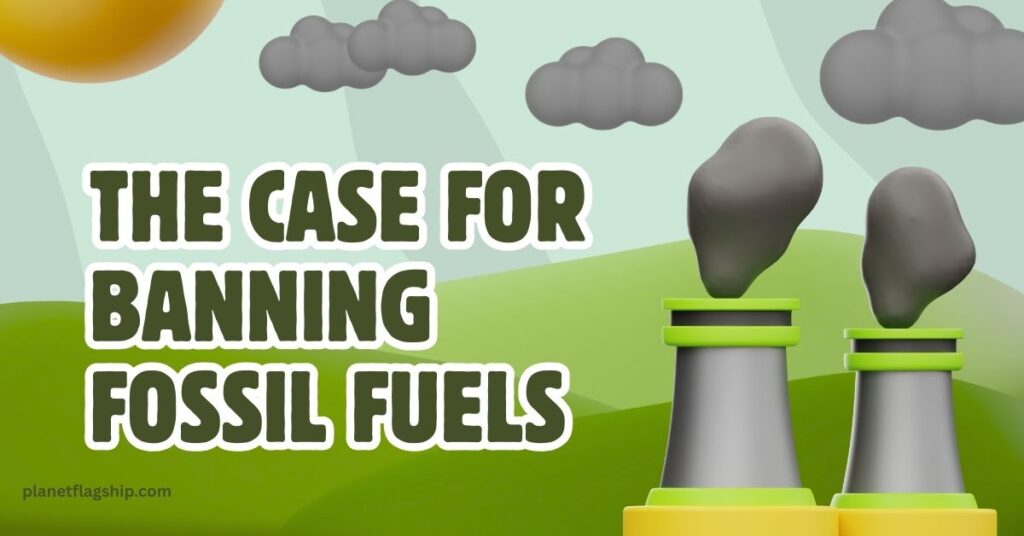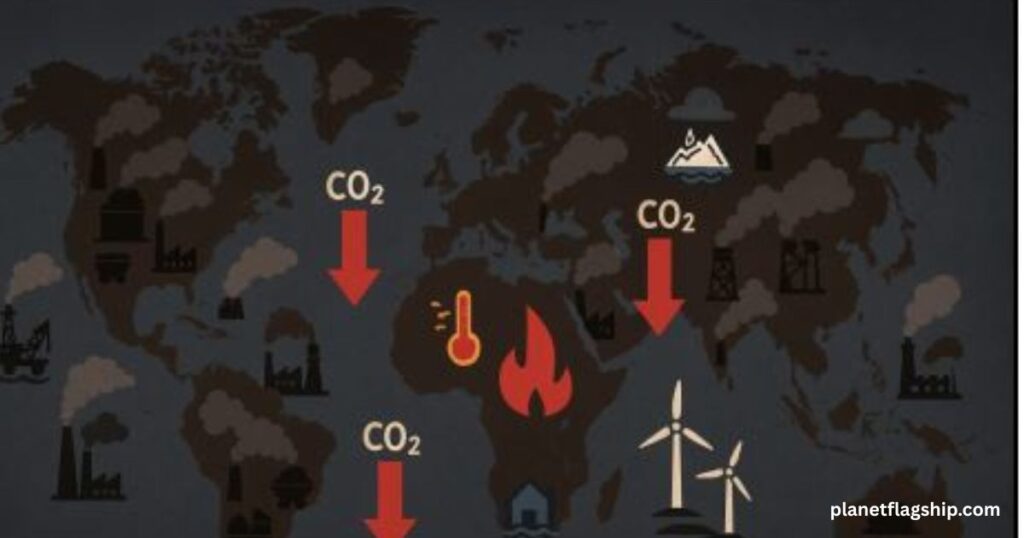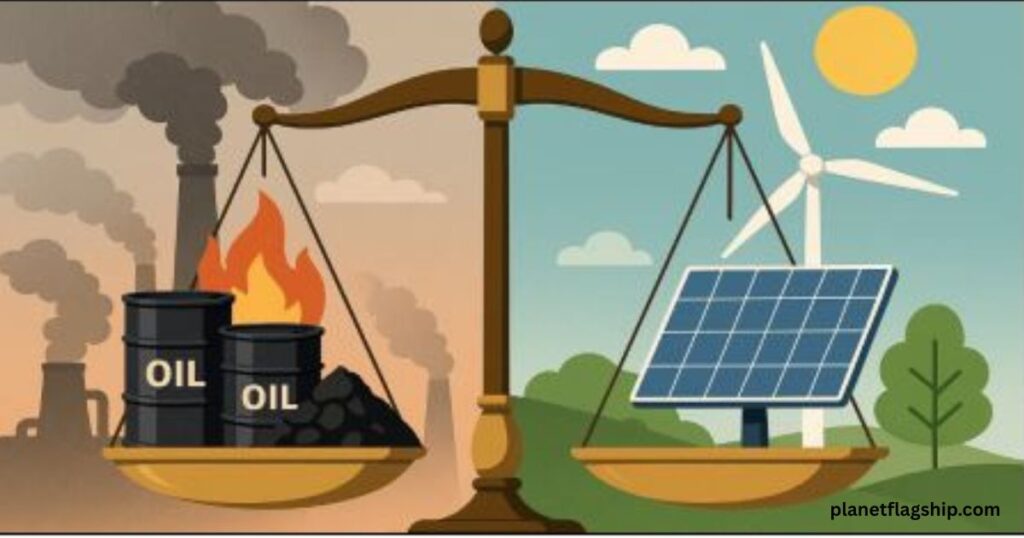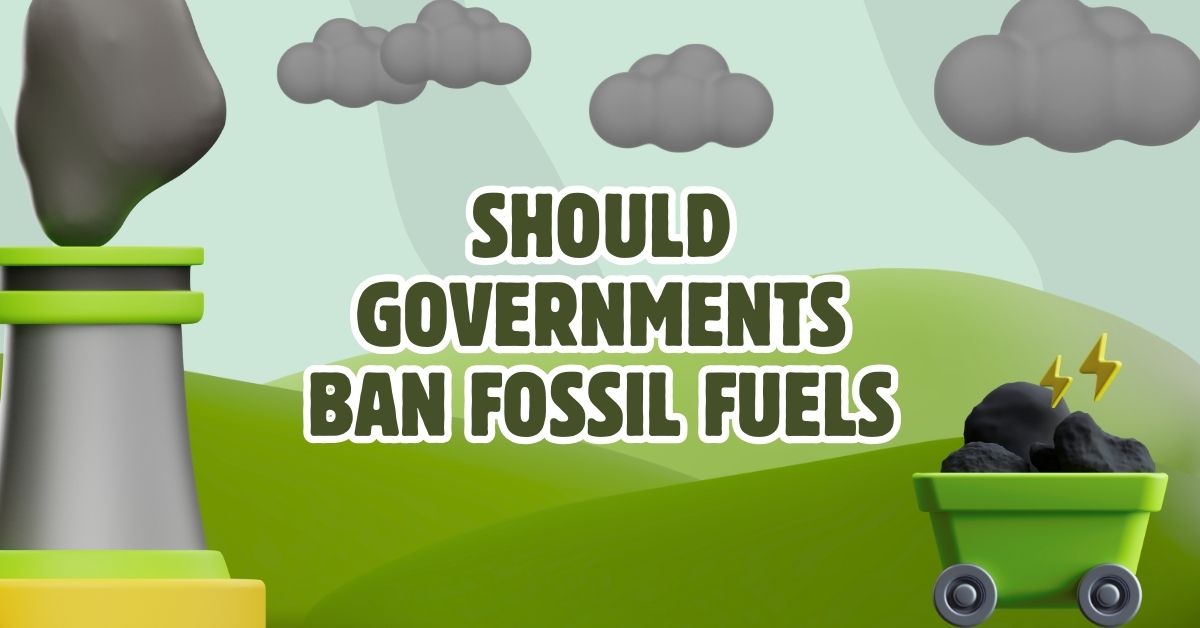Introduction
In an era of rising global temperatures, melting glaciers, and devastating climate events, the question of whether Should governments ban fossil fuels has become increasingly urgent. Fossil fuels coal, oil, and natural gas have powered human progress for over a century, fueling transportation, electricity generation, and industrial development. However, their continued use comes at a steep cost to the environment, human health, and future generations.
Today, governments face a critical dilemma: should they enact stringent policies that eliminate fossil fuels or adopt a more gradual and adaptive approach to energy transition? While banning fossil fuels could lead to significant environmental gains, it also raises serious concerns about economic disruption, energy security, and social equity, especially for developing nations.
This article examines the advantages and disadvantages of banning fossil fuels, examining the environmental, economic, and social implications of this complex debate. By examining current research and global policy trends, we aim to provide a balanced view that informs sustainable decision-making in an increasingly warming world.
What Are Fossil Fuels, and Why Are They Still Used?
Fossil fuels, namely coal, oil, and natural gas, are natural energy sources formed from the decomposed remains of ancient plants and animals. After millions of years under intense heat and pressure, these remains transformed into carbon-rich fuels that are now extracted from beneath the Earth’s surface. These energy sources have powered the industrial world for centuries, enabling rapid technological advancement, mass production, and global transportation networks.
Despite increasing awareness of their environmental impact, fossil fuels remain the dominant source of energy globally. According to the International Energy Agency (IEA), they accounted for around 80% of the world’s primary energy consumption as of 2023.
But why are they still so prevalent?
- High Energy Density: Fossil fuels contain a large amount of energy per unit of weight, making them highly efficient for industrial processes and transportation.
- Established Infrastructure: Most countries have built extensive energy systems, including power plants, pipelines, and gas stations, based on fossil fuel technologies.
- Affordability: Fossil fuels remain relatively cheap, especially in regions where production is domestic or heavily subsidized.
- Reliability: Unlike some renewable sources, fossil fuels provide consistent and controllable energy output regardless of weather or time of day.
In essence, the global economy has been largely driven by fossil fuels. This dependency makes any attempt to ban them a highly complex and politically sensitive issue, despite the known consequences of their continued use.
The Case for Banning Fossil Fuels

As the impacts of climate change become more severe and widespread, the argument for banning fossil fuels grows stronger. From rising sea levels to worsening air pollution, the evidence is clear: continuing to rely on coal, oil, and gas poses a significant threat to both the planet and its people. Here’s why many experts and environmental groups support a complete phase-out.
Environmental Benefits
Banning fossil fuels would bring immediate and long-term environmental advantages:
- Climate Change Mitigation: Burning fossil fuels is the largest contributor to greenhouse gas emissions. According to the Intergovernmental Panel on Climate Change (IPCC), fossil fuel combustion accounts for over 75% of global CO₂ emissions. A ban would significantly reduce these emissions, slowing global warming and helping meet the Paris Agreement’s 1.5°C target.
- Pollution Reduction: Extracting and burning fossil fuels releases harmful pollutants like sulfur dioxide, nitrogen oxides, and fine particulate matter. These pollutants contaminate the air, water, and soil, harming ecosystems and human communities.
- Preservation of Natural Resources: Fossil fuel operations frequently damage forests, wetlands, and marine ecosystems. Ending these practices would help conserve biodiversity and protect natural habitats.
Health and Social Justice
The environmental damage caused by fossil fuels directly impacts human health and amplifies social inequalities:
- Public Health Risks: Air pollution from fossil fuels is a leading cause of premature death. The World Health Organization (WHO) estimates that around 7 million people die annually from diseases linked to air pollution, including lung cancer, heart disease, and stroke.
- Environmental Injustice: Vulnerable and low-income communities often live near power plants, refineries, or coal mines. These areas suffer disproportionately from pollution-related illnesses, degraded environments, and poor living conditions.
- Climate Refugees: Fossil fuel-driven climate change contributes to extreme weather events, droughts, and sea-level rise, forcing millions of people to migrate from regions that have become uninhabitable. A ban could help reduce future displacement.
Table 1: Regional Health Burden Attributable to Fossil Fuel–Related Air Pollution
| Region | Annual Premature Deaths (millions) | Major Cause |
| Southeast Asia | 2.3 million | PM2.5, ozone |
| Africa | 1.2 million | Indoor smoke |
| Europe | 0.6 million | Fossil pollution |
| North America | 0.4 million | Traffic + Industry |
Economic Innovation and Green Job Creation
Although critics warn of economic disruption, banning fossil fuels could actually stimulate new economic opportunities:
- Investment in Renewable Energy: Redirecting subsidies and investments toward solar, wind, and hydropower would accelerate the global energy transition. The International Renewable Energy Agency (IRENA) reports that the renewable energy sector could generate over 40 million jobs globally by 2050.
- Clean Tech Development: A ban on fossil fuels would drive innovation in energy storage, electric vehicles, green hydrogen, and smart grids, creating high-skill jobs and new industries.
- Long-Term Cost Savings: Fossil fuel-related climate disasters incur billions of dollars in annual recovery and damages. Transitioning to cleaner energy could ultimately alleviate these financial burdens.
A complete ban on fossil fuels could be the turning point for a healthier planet, more equitable societies, and a resilient green economy. However, such a move is not without its challenges, which brings us to the other side of the debate.
The Case against a Fossil Fuel Ban
While the environmental and health arguments for banning fossil fuels are compelling, a sudden or poorly managed ban could cause serious disruptions. From economic shocks to energy shortages, the risks of phasing out fossil fuels too quickly cannot be ignored, especially in developing regions where energy access remains limited. Here are the main concerns.
Economic Disruption and Energy Security
A ban on fossil fuels could lead to major economic and logistical challenges:
- Global Economic Shock: Fossil fuel industries support millions of jobs and contribute significantly to national GDPs. Countries such as Saudi Arabia, Russia, and Venezuela heavily rely on oil exports for their revenue. An abrupt ban could destabilize these economies.
- Job Losses in Fossil Industries: In coal-mining towns or oil-rich regions, entire communities rely heavily on employment in the fossil fuel industry. Without adequate transition planning, a ban could result in widespread unemployment and social unrest.
- Energy Reliability Risks: Many countries still depend on fossil fuels for base-load electricity. Removing them too quickly without sufficient renewable alternatives could cause blackouts, energy shortages, or rising prices.
Technological and Infrastructure Limitations
Although renewable energy is growing fast, current technologies still face limitations:
- Intermittency Issues: Solar and wind energy are weather-dependent and can’t always produce consistent electricity. Energy storage solutions, such as batteries, are improving but remain costly and limited in capacity.
- Lack of Infrastructure: Many regions, especially in the Global South, lack the infrastructure to support large-scale renewable energy deployment. Building new grids, charging stations, and storage systems will take years and significant investment.
- Industrial Demand: Heavy industries such as steel, cement, and aviation are challenging to decarbonize using current technologies. Fossil fuels continue to play a crucial role in powering these sectors.
Political Resistance and Public Backlash

Energy policy is deeply political, and fossil fuels are deeply embedded in national priorities:
- Powerful Fossil Fuel Lobbies: Oil and gas companies have major influence over policymakers. Many governments subsidize fossil fuels to keep energy prices low, making reform politically difficult.
- Rising Energy Prices: Banning fossil fuels could lead to increased fuel and electricity prices, particularly during the transition period. This can lead to protests and resistance from the public, as seen in movements like the “Yellow Vests” in France.
- Geopolitical Conflicts: A sudden shift away from fossil fuels could alter global power dynamics and trigger conflicts over remaining resources, trade routes, and access to renewable technologies.
In short, while a fossil fuel ban could drive environmental progress, it also risks triggering economic instability, energy shortages, and political opposition. A thoughtful, phased approach rather than a blanket ban may offer a more practical path forward.
Comparative Analysis: Fossil Fuel–Based vs. Low-Fossil Fuel Energy Economies
Table 2: Emissions Profile of Fossil Fuel–Dependent Economies – Countries with high fossil fuel reliance tend to exhibit significantly higher CO₂ emissions per capita and contribute disproportionately to global greenhouse gas levels.
| Country | Fossil Fuel Share of Energy Mix (%) | CO₂ Emissions per Capita (tons) | Total CO₂ Emissions (Mt) | Renewable Share (%) | Notes |
| Saudi Arabia | ~99% | 16.6 | ~582 | <1% | Major oil producer; negligible renewable integration |
| Australia | ~90% | 15.2 | ~373 | ~10% | Coal-heavy electricity mix |
| United States | ~79% | 13.5 | ~4,745 | ~21% | Some state-led transitions are underway |
| China | ~83% | 7.4 | ~10,065 | ~26% | World’s largest emitter |
| India | ~73% | 2.1 | ~2,884 | ~22% | Still growing energy access |
Table 3: Emissions Profile of Renewable-Driven Economies – Nations with strong renewable energy integration and low fossil fuel dependence maintain substantially lower carbon footprints and offer viable models for sustainable energy transitions.
| Country | Fossil Fuel Share (%) | CO₂ Emissions per Capita (tons) | Total CO₂ Emissions (Mt) | Renewable Share (%) | Notes |
| Sweden | ~29% | 4.1 | ~40 | ~55% (hydro + wind) | Heavy use of hydro, nuclear, and biomass |
| Norway | ~30% | 7.8 | ~41 | ~65% (mainly hydro) | High per capita due to oil exports, low domestic use |
| Costa Rica | <20% | 1.6 | ~9 | ~98% (hydro, wind) | Nearly 100% renewable electricity |
| Iceland | <15% | 5.2 | ~2 | ~100% (geothermal + hydro) | Renewable electricity since the early 2000s |
| Bhutan | Negligible | <1.0 | <1 | ~100% hydro | Carbon-negative country |
Middle Ground: Regulation over Complete Bans

Banning fossil fuels altogether may sound like a quick fix for climate change, but for many countries, it’s not a realistic solution—at least not yet. Nations around the world still rely heavily on coal, oil, and gas for electricity, transportation, and economic activity. A sudden ban could lead to serious disruptions in energy access, employment, and industrial output. For this reason, many experts recommend a balanced approach: regulating fossil fuel use strictly while transitioning gradually to cleaner energy.
Carbon Pricing and Emissions Trading
Governments are adopting market-based strategies, such as carbon pricing and Emissions Trading Systems (ETS), to reduce fossil fuel use. These methods place a cost on carbon emissions, encouraging industries to shift toward greener alternatives. According to the World Bank, over 70 countries and regions had implemented carbon pricing mechanisms by 2023.
Nations such as Sweden and Canada have successfully utilized these systems to reduce emissions while maintaining robust economies.
Phasing Out with Clear Timelines
Instead of sudden bans, several countries are implementing clear, time-bound roadmaps. For example:
- The UK plans to ban the sale of new petrol and diesel cars by 2035.
- Germany aims to phase out coal power entirely by 2038.
Such timelines provide businesses and workers with time to adapt, enabling governments to invest in cleaner alternatives and retraining programs.
Supporting Developing Countries
Developing countries often lack the financial and technical resources for a quick energy transition. The UNFCCC promotes the principle of “common but differentiated responsibilities,” urging wealthier nations to support poorer ones through funding, technology sharing, and capacity-building.
Public-Private Partnerships
Governments alone cannot drive the energy shift. Public-private partnerships can accelerate innovation and the adoption of renewable energy. Examples include India’s International Solar Alliance and the U.S. Inflation Reduction Act, which provides incentives for investments in clean technology.
FAQs: Should Governments Ban Fossil Fuels?
Why are fossil fuels still widely used despite their environmental impact?
Fossil fuels remain dominant because they provide high energy density, affordability, reliable output, and an established global infrastructure. Most economies are deeply dependent on coal, oil, and gas for industrial growth and energy stability.
What would be the benefits of banning fossil fuels?
A ban could dramatically cut greenhouse gas emissions, improve air quality, reduce pollution-related deaths, and protect biodiversity. It would also accelerate renewable energy adoption and create millions of green jobs worldwide.
What are the risks of banning fossil fuels too quickly?
An abrupt ban could destabilize economies, cause mass unemployment in fossil-fuel-dependent regions, and trigger energy shortages. Developing nations with weak infrastructure would be especially vulnerable.
Are renewables ready to fully replace fossil fuels?
Renewables are growing fast, but challenges like intermittency, storage costs, and industrial demand remain. While renewable energy provides nearly 100% electricity in countries like Costa Rica and Iceland, global adoption will take time and investment.
What is a realistic alternative to an outright ban?
A phased transition with clear timelines, carbon pricing, emissions trading, and international support is more practical. This approach allows nations to build renewable infrastructure, retrain workers, and protect vulnerable communities.
Conclusion
The debate over whether governments should ban fossil fuels is far from black and white. On one hand, fossil fuels are a major driver of climate change, environmental degradation, and public health crises. On the other hand, they remain deeply integrated into the global economy, powering industries, generating employment, and ensuring energy access for billions of people. The arguments in favor of a ban highlight the urgent need to protect the planet, safeguard public health, and transition toward a greener, more sustainable future. Yet the opposing side rightly warns of the economic shocks, infrastructure gaps, and political complexities that would be involved in such a drastic move.
For many countries, especially those still in the process of development, a total ban may not be feasible without international support, technological assistance, and a well-planned energy transition. Rather than an abrupt ban, a phased and just transition seems to be the most realistic path forward. Governments should focus on gradually reducing their reliance on fossil fuels by investing in renewable energy, creating green jobs, and supporting vulnerable communities during the transition.
As individuals, we can also contribute by reducing our carbon footprint, supporting clean energy policies, and staying informed about the issues. The future depends on the actions we take today together; we can fuel a cleaner tomorrow.
References
Carley, S., & Konisky, D. M. (2020). The justice and equity implications of the clean energy transition. Nature Energy, 5(8), 569–577. https://doi.org/10.1038/s41560-020-0641-6
Green, F. (2018). The logic of fossil fuel bans. Nature Climate Change, 8(6), 449–451. https://doi.org/10.1038/s41558-018-0172-3
International Energy Agency. (2021). Net zero by 2050: A roadmap for the global energy sector. https://www.iea.org/reports/net-zero-by-2050
International Energy Agency. (2022). World energy outlook 2022. https://www.iea.org/reports/world-energy-outlook-2022
International Energy Agency. (2023). World energy outlook 2023. https://www.iea.org/reports/world-energy-outlook-2023
International Renewable Energy Agency. (2022). Renewable energy and jobs: Annual review 2022. https://www.irena.org/publications/2022/Sep/Renewable-Energy-and-Jobs-Annual-Review-2022
Intergovernmental Panel on Climate Change. (2022). Climate change 2022: Mitigation of climate change. Working Group III contribution to the Sixth Assessment Report. https://www.ipcc.ch/report/ar6/wg3/
Intergovernmental Panel on Climate Change. (2023). AR6 synthesis report: Climate change 2023. https://www.ipcc.ch/report/ar6/syr/
Organisation for Economic Co-operation and Development. (2023). OECD inventory of support measures for fossil fuels. https://www.oecd.org/fossil-fuels/
Piggot, G., Erickson, P., van Asselt, H., & Lazarus, M. (2020). Curbing fossil fuel supply to achieve climate goals. Climate Policy, 20(8), 881–887. https://doi.org/10.1080/14693062.2020.1804315
World Bank. (2023). Carbon pricing dashboard. https://carbonpricingdashboard.worldbank.org/
World Health Organization. (2023). Ambient (outdoor) air pollution. https://www.who.int/news-room/fact-sheets/detail/ambient-(outdoor)-air-quality-and-health
Table 1: Source: World Health Organization (2021); Lelieveld et al. (2019); Vohra et al. (2021)
Tables 2 & 3: Source: Compiled from data provided by the International Energy Agency (2023), Our World in Data (2023), Global Carbon Atlas (2023), International Renewable Energy Agency (2024), World Bank (2023), and Climate Transparency Report (2023).

John is a professional blogger and passionate advocate for environmental sustainability. With years of experience exploring eco-friendly practices and green innovations, he shares insightful articles on Planet Flagship to inspire a sustainable future. John’s expertise lies in making complex environmental topics accessible and actionable, empowering readers to make meaningful changes for the planet.
